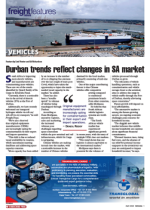South Africa’s vehicle manufacturing sector is truly global, and is looking to Africa for growth.The interconnectedness of the South African motor sector with the rest of the world is demonstrated by Volkswagen South Africa’s (VWSA) statistics.In 2023, the Kariega, Uitenhage-based company exported 101 557 units.On average the company exports 70% of the vehicles produced at its Kariega plant.By the end of February 2024, the company had exported 1 498 835 units to 38 countries since it entered the global market, according to head of group comunications, Andile Dlamini.In addition to fully built-up vehicles, the company exported 1 066 751 components in 2023.These were made up of ceded and non-ceded components (ceded parts are produced by a Volkswagen supplier and exported on behalf of VWSA. Non-ceded components are produced by VW and local suppliers).Turning to inward logistics, Dlamini says VWSA sources components directly from manufacturers in Europe (Austria, Czech Republic, Germany, Poland); Asia (China, India, Japan, Philippines, Taiwan, Thailand, Turkey), Mexico and Morocco.Completely knocked down (CKD) units are sourced from Argentina, Brazil, Germany, and Spain.South Africa’s other original equipment (OEM) manufacturers have similar profiles.VW is among the first to prioritise Africa, having established a new “sub-Saharan” region to develop the African market. It covers all countries south of the Sahara, and is being driven by Volkswagen South Africa which has been assembling vehicles for over 72 years. There are four assembly facilities at present – South Africa, Kenya, Rwanda, and Ghana. Kenya is home to the first VW African assembly facility outside of South Africa, with the opening of a plant in Thika in December 2016. VW has been active in Rwanda since mid-2018, when it launched an app-based car-sharing service.“Rwanda has been the success story of our growth plans in sub-Saharan Africa. It is also the innovation hub of our sustainable mobility lighthouse projects on the continent,” said Volkswagen Group South Africa chairperson and managing director, Martina Biene.“Our mobility solutions services business, which includes ride-hailing and corporate car sharing, broke even last year “Rwanda was also the first country in sub-Saharan Africa to launch a Volkswagen electric vehicle with the e-Golfs.”In March 2023 VW took over the responsibilities of the assembly facility in Ghana from its licensed importer, Universal Motors Limited.Universal Motors started assembling VW vehicles in 2020 following the government implementing the Ghana Automotive Development Policy (G A DP).In addition, VW has a presence in 17 countries in sub-Saharan Africa through licensed importers which distribute passenger and commercial vehicles.Biene is positive about Africa’s growth potential. Speaking at the ceremony to mark the handover of the Ghana plant, she said a number of African countries had introduced what she described as compelling incentive plans for locally assembled vehicles.“We are encouraged by the automotive policy changes which some of the countries have implemented or are in the process of implementing. These policies will help us to sell new high-quality vehicles which are backed by a well-established global brand to our African customers,” said Biene.Sub-Saharan Africa had become very important for the sustainability of VW, she added. “The future of Volkswagen is in Africa. We are therefore accelerating our growth strategy on the continent by playing a pioneering and leading role in the development of the automotive industry.”According to the African Development Bank, of the world’s 10 fastest-growing economies, five are in Africa – Rwanda, Côte d’Ivoire, Benin, Ethiopia, and Tanzania.This correlates with its experience as Rwanda and Côte d’Ivoire are two of VW’s fastest-growing markets, according to Biene.

